Yves here. I must confess, despite covering Cyrpus’ 2013 banking crisis in gory detail and debunking a lot of distorted reporting, I failed to connect the most important dots. It was obvious that Cyprus was being demonized a dirty Russian money center (ahem, what about the entire London high end real estate market?) when that was far from a significant portion of the domestic banking industry. Cyprus was in many ways a smaller version of Luxembourg: an outsided banking sector with high level professionals (lawyers, accountants) who in large degree served international investors, in this case foreign companies (and often even Russians themselves) who chose to invest in Russia via Cyprus to get the benefit of English law courts, which were widely seen as cleaner and more predictable than Russian courts. The other big source of Cyprus banking activity was Brits retiring to Cyprus (and moving their monies into Cyprus, albeit often Cyprus branches of UK banks) and mid-level wealthy Russians who would have second homes there.
It was obvious that the “rescue” of Cyprus was designed to be punitive. It did not occur to me that this was meant primarily as an economic sanction against Russia, because the belligerent US intent towards Russia hadn’t yet become clear (and in my defense, despite numerous posts on the topic, no one in the comments section, nor contacts in Cyprus, saw this angle). The hostilities became evident when Urkaine’s president Viktor Yanukovych was forced out of office a mere six weeks before elections that he was certain to lose, and his opponents replaced the constitution. The jousting over Ukraine led the US and EU to impose economic sanctions on Russia and call for the ouster of Putin. The result was that Russia got Crimea and Putin’s popularity rose. Oops.
By John Helmer, the longest continuously serving foreign correspondent in Russia, and the only western journalist to direct his own bureau independent of single national or commercial ties. Helmer has also been a professor of political science, and an advisor to government heads in Greece, the United States, and Asia. He is the first and only member of a US presidential administration (Jimmy Carter) to establish himself in Russia. Originally published at Dances with Bears
In the dark of Monday night before light broke on Tuesday, Cyprus, the small Mediterranean island invaded and occupied for 42 years by Turkish troops with US and UK backing, began a revolution its president, Nicos Anastasiades (lead image, 4), doesn’t want.
The collapse of negotiations between the Greek Cypriot and Turkish Cypriot communities, arranged by United Nations (UN) officials at the Swiss resort of Mont Pèlerin, was confirmed by a UN communique issued at 1:30 in the morning. “They have not been able to achieve the necessary further convergences on criteria for territorial adjustment that would have paved the way for the last phase of the talks,” the bulletin announced. “The two sides have decided to return to Cyprus and reflect on the way forward.”
“The Americans, the Turks, the European Union, and the British were sure there’s no deal Anastasiades could not be persuaded to accept,” said a senior Cyprus official, now retired, “so long as there’s a large enough percentage in it for himself. Anastasiades’s weakness is his personal corruption. This time, though, the Turks raised their bid too high. The Americans lost their cards in their election on November 8. The British aren’t players in Europe now. And for the first time there was a display of Greek and Russian power which has changed the game entirely. Greece first, then Russia have cut the legs off the negotiating table – Anastasiades’s legs too.”
Anastasiades’s spokesman, Nicos Christodoulides, told the Cyprus press: “we are not at all happy about the outcome of the talks… I sincerely regret that as a result of the Turkish attitude has not been possible to complete a very promising process that until now, through a very productive negotiation, has led to very positive developments for the whole people of Cyprus.”
Publicly, the stumbling block had been the insistence of the Turkish Cypriot leader, Mustafa Akinci and Turkish President Recep Tayyip Erdogan, on a formula cutting the number of Greek Cypriots who would be allowed to return to their homes, preventing the revival of Greek-Cypriot towns in the occupied northern sector of the island; and restricting Greek-Cypriot access to invest in the coast line and the gas-rich offshore seabed.
These “convergences on territorial adjustment”, as the UN called them, were quite different from the “thirds formula” which in 2009 the Turkish government in Ankara secretly told Washington it would accept. According to a classified US Embassy cable, released by Wikileaks, “Ankara envisions that roughly one third of the claims would be resolved through compensation, one third by exchanges, and one third by returnees. The bank financing would allow Greek Cypriots who agree on compensation to be paid immediately, if they so choose, but would also enable them to wait until the market value of the property rises as expected several years after the island is reunited.”
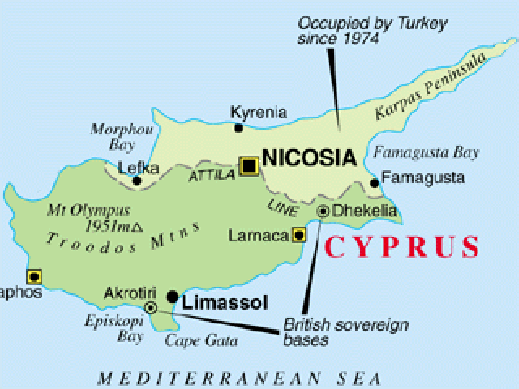
The Turkish scheme encouraged and endorsed by the US was that “property [w]as the key element of the Cyprus talks”. With enough cash paid up front, the Greek Cypriots would be persuaded to be “realistic”. The US Embassy cable reported the Turkish government’s plan “to provide financing via Turkish banks for Greek Cypriots whose property claims are settled by compensation.”
In the latest round of talks, which started in 2014, the financing mechanism has shifted to international banks backed by US and EU guarantees, as well as government aid. The territorial formula was re-weighted, however, as the Turks decided they would be better off in their present situation than with the territorial and financial concessions required by the old formula. “Their new formula was more like one-half cash compensation, one-quarter exchange, one-quarter return”, a source close to the talks says. Anastasiades has so far not made public the precise terms.

Opening of the Mont Pèlerin talks, October 29, 2016 -- Cyprus delegation to left, Turkish-Cypriot delegation to right
The Turks also insisted the new formula should be incorporated in their map of the power distribution between the communities on the island. That map, the Turks also demanded, should be swiftly endorsed by a meeting of guarantee powers – Turkey, the UK, and Greece. The troika had been part of the independence pact when London gave up its colonial rule of the island in 1960. Ankara’s insistence on the guarantee proviso also meant that Turkish troops would stay on the island.
This was anathema to the Greek Cypriots, but not an insurmountable obstacle for Anastasiades. Cypriot and Greek sources say he was persuaded by Victoria Nuland (lead image, 1), the State Department official in charge of US policy in the region. She told Anastasiades the Turkish forces could be withdrawn to appease Cypriot voters, but then returned under a NATO flag in a new American-funded NATO base in the north. The Nuland plan was accompanied by further promises of US payoffs for Anastasiades and his supporters.
Nuland knew her man, so there were sticks as well as carrots. To ensure Anastasiades stuck to his bargain, the Nuland plan also threatened him with US legal trouble for himself, his family, his bank accounts, and his law firm stemming from their corrupt involvement with Leonid Lebedev. He’s the the fugitive Russian businessman, now sheltered by the US, whom Anastasiades and his law partners served for almost a decade. For details of their dealings, and the origin of Lebedev’s fortune in Russian corporate crime, read this.
Anastasiades claims through his spokesman there has been no Nuland plan. He refers questions about Lebedev to his law firm. These questions are shortly to take the form of New York court-ordered subpoenas for evidence from the Antasasiades law firm in Limassol, before he became president; and for his business partner still at the firm, Theofanis Philippou. Click for more.
Sources close to the Cypriot negotiating side now say the failure of the Mont Pèlerin negotiations to produce property or money means Anastasiades is much more vulnerable among Cyprus voters than he would have been if he had returned from Switzerland waving a property map, and promising cash for concessions to the Turks.
In defence of Anastasiades, some local supporters say he can’t openly blame the Turks, nor can he reveal their terms, but he can still revive the bargaining. Says a well-informed source in Limassol, the Cyprus business centre, the breakdown reports are “just posturing. [Anastasiades] has to show he got something, so the talks will continue. I do not expect the [Greek Cypriots] will end the talks so abruptly. Hard bargaining is just getting started.”
Political sources in Nicosia and in Athens dismiss this as “businessmen’s thinking. The situation has changed. Anastasiades’s approach is a dead-end.” A leading Cypriot strategist adds: “Anastasiades has a solid party following. He is a Teflon president on corruption scandals. But he over-committeed himself publicly to the return of territory and no Turkish troops. Anastasiades cannot sell a solution that includes the Cyprus problem. The outcome must be one without the Cyprus problem.”
The “Cyprus problem” is shorthand for the role of the military forces of Greece, Turkey and the UK as security guarantees for the island. The breakthrough came from Greek Foreign Minister, Nikos Kotzias (below, left), who has spent months changing Greek policy to explicit rejection, not only of Greek participation in the guarantees, but also of the entire security framework proposed by Nuland.
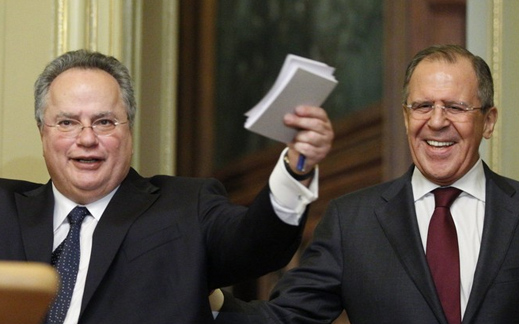
The new script -- Greek Foreign Minister Nikos Kotzias, with Russian Foreign Minister Sergei Lavrov.
Sources close to Kotzias say he regards the three-power guarantees as a colonial hangover which is no longer possible for independent states like Cyprus and Greece to accept. One of the sources explains: “The so called guarantees stand on a tripod. Without Greece the tripod cannot stand. Moreover, Greece as an EU member and a democracy cannot in either capacity cannot guarantee a third country. The Greek Constitution cannot allow it. And by the way, neither does UK law. So Turkey is left standing alone, with Nuland pushing. So without Greece, the system of guarantees for Cyprus can have no legitimacy. The likes of Anastasiades see this as the ‘Cyprus problem’. Kotzias wants a Cyprus solution without the ‘Cyprus problem’. That means no system of guarantees. If you preserve guarantees and allow Turkish troops or NATO troops to stay, it’s back to square one. Actually, it’s worse for Cyprus, because it will be forever.
Greek reporter Costa Venizelou revealed this week that Kotzias has been building academic, expert and government support in Athens for this policy since a closed-door conference in Oxford in mid-January. From that, according to Venizelou, Kotzias composed a paper which became Greek policy, but ran into resistance from Anastasiades in Nicosia.
Nuland backed Anastasiades against Kotzias. But Nuland, a candidate to become Secretary of State if Hillary Clinton had won the election of November 8, became a nonentity the day after.
When Anastasiades (below, left) met with Greek Prime Minister Alexis Tsipras (right) in Athens on November 16, before the talks resumed at Mont Pèlerin, Anastasiades was obliged to listen, then accept the new Greek doctrine.
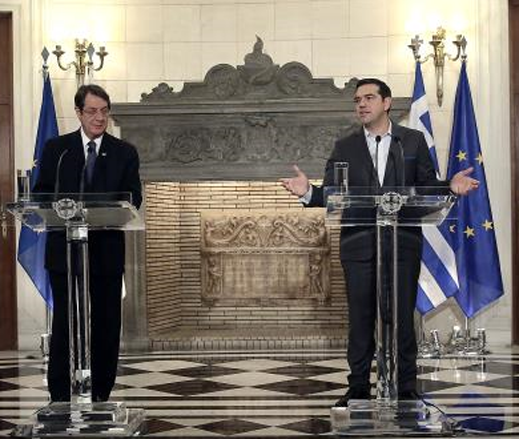
The Cyprus News Agency reported: “The Cyprus President and Greek Prime Minister stressed Wednesday that no European state should be under warranty of any country, after their meeting in Athens where Nicos Anastasiades fully briefed Alexis Tsipras on the negotiations that took place last week in Mont Pelerin, Switzerland.” The Greek-language media amplified Tsipras’s remarks. “[Tsipras] also pointed out that in the context of the solution of the Cyprus problem, guarantees in Cyprus should be abolished. As he said, Greece is involved and actively engaged in the international security issue. “Let me be clear, that this issue can be resolved in a multilateral framework , only on the basis of an agreement for the abolition of the outdated system of guarantees and for the full withdrawal of Turkish troops from the island”, he said.”
Kotzias followed up with his counterparts in Germany and France to produce their agreement that the guarantee system is done for, and Turkish military forces in Cyprus, too. Kotzias told Berlin and Paris the principle of no guarantees applies to all countries, and not simply to Cyprus.
Cyprus Mail, the English-language broadcaster for the UK and US Embassies in Cyprus, was certain Anastasiades would accept the Turkish offer on territory and money. The newspaper editorialized that blame for failure to agree should belong to Athens. According to the newspaper on November 19, “Our View: Anastasiades should not be swayed by possible Greek spanner in works…[Anastasiades] has shown he could handle local [Cypriot] opposition to a settlement, but a Greek government not supporting the peace procedure, as it entered its final stage, is a completely different problem.”
The Cyprus Mail has also castigated the Kremlin, President Vladimir Putin, Foreign Minister Sergei Lavrov, and Russian Ambassador to Cyprus Stanislav Osadchiy, for promoting the no-guarantees position, and for manipulating Cypriot public opinion, as well as the government in Athens. The Russian officials have repeatedly said they were opposed to the Nuland plan, and to any form of US and NATO-directed conference to rubber-stamp the terms Moscow suspected Anastasiades was ready to accept.
On September 15, Foreign Ministry spokesman Maria Zakharova said in Moscow: “We consider some of our Western partners’ persistent attempts to speed up negotiations and push for a solution at all costs to be unacceptable. This is not right. The failure of the [UN Secretary-General Kofi] Annan plan for Cyprus [2004], as we all remember, is evidence of the destructiveness of such external pressure.” Days later the spokesman added that the only legitimate security guaranty system was the UN Security Council. “The existing system of guarantees [for Cyprus] has proved its inefficiency,” she noted. “Along with this, we do not rule out that Cyprus can address the UN Security Council with a proposal to consider the possibility of providing necessary guarantees from this respected international organization.”
Lavrov was in Athens on November 1 and 2, meeting Kotzias and Tsipras. He preceded Anastasiades by a fortnight. Lavrov in his press remarks and his ministry in its communiques played up the warmth of the relationship with Kotzias and Tsipras, but played down their discussion of the Cyprus security formula. “Naturally, we discussed the developments around the Cyprus settlement,” Lavrov told a reporter. “In this regard, it is necessary to fulfil UN resolutions just as in all other crises. They outline the contours of a settlement that will be stable and acceptable both for Turkish and Greek Cypriots.” The Foreign Ministry communique on Lavrov’s visit to Athens omitted to mention Cyprus.
Veteran Greek and Cypriot officials are also reticent about the role and value of Russian support for the Kotzias doctrine. “The long history shows,” comments one, “that whether we refer to Empress Catherine, Stalin, or Putin, what the Russians say to the Hellenes and what they do aren’t the same thing.” For background on unfulfilled Russian promises, read this.
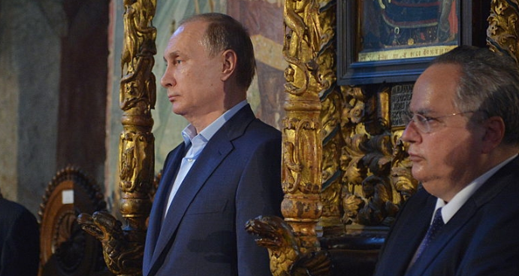
Putin with Kotzias, Protaton church (the Church of the Assumption of Our Lady), Mt Athos , May 28, 2016
“I agree,” adds a veteran Cyprus official, referring to UN Secretary-General Annan’s attempt to press the Greek Cypriots into a disadvantageous deal with the Turks in 2004. “But the Russians hold the Security Council veto. This is what saved us in 2004 when they [the US and Turkey] tried to push the Annan deal through the Security Council.”
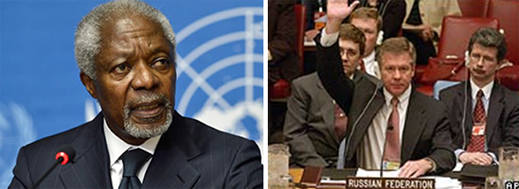
Left, Kofi Annan; right, Gennady Gatilov votes no on the Annan plan, April 22, 2004
Cypriot policymakers, like their counterparts in Greece, are reluctant to say what they think of Russian military operations in Syria, new naval deployments in the Eastern Mediterranean, and the recovery of the Damascus regime. “Is there an impact of the Russian military presence in the Eastern Mediterranean on the Cyprus negotiations?” a Cyprus official muses. “Let’s not get into details. Let’s just say it’s better that it exists than not.” A Moscow source adds: “the success of the Russian military engagement in Syria, and the failures of US and NATO forces, are an obvious warning to Erdogan. Russian arms are now a powerful deterrent to Turkish military adventurism towards Greece and Cyprus.”
This has triggered a media campaign in both countries, as well as in London, Brussels and Washington, to close the Mediterranean to the Russian Navy. The Cyprus Mail reported yesterday that jet fuel for Russian Air Force operations in Syria is being “smuggled” by tankers making port calls in Cyprus, enroute to Syria. The origin of the story was claimed to be “an intelligence source with a European Union government”.
Although Russian officials have identified the UN Security Council as the only legitimate guarantor of Cyprus security, they, together with Cyprus and Greek representatives, are privately critical of the role played in the negotiations by Espen Barth Eide (lead image-3), the Special Representative of the UN Secretary-General on Cyprus. A native of Norway, he was Norway’s defence minister and foreign minister in Labor Party governments. His career advanced with patronage from the former party leader and former prime minister, Jens Stoltenberg. Stoltenberg became NATO’s Secretary-General in October 2014. For more details on Eide’s negotiating role in Cyprus, click.
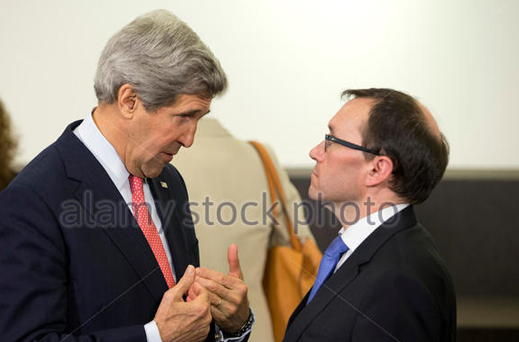
Eide (right) meeting US Secretary of State John Kerry in Cyprus, December 2015
A US Embassy cable from Oslo in 2008, published by Wikileaks, has reported Eide as “a skilled and subtle interagency player who is largely pro-U.S…On several important issues Barth Eide has been helpful, such as missile defense (where he helped prevent a Norwegian veto of NATO plans)…[he] also takes pains to stress NATO as the cornerstone of GON [Government of Norway] security policy and the importance of the Norwegian-U.S. relationship.”. The US cable also reported Eide was ambitious for promotion to a “high ranking UN or EU position”, and warned that he “should not be trusted.”
“Typical two-faced Norwegian,” comments a Cyprus source close to the Foreign Ministry. “Eide is ingratiating, and claims to be even-handed. In practice, he’s does what NATO and the US want. A ventriloquisling.”


I don’t want to leave this story uncommented which makes it look like nobody is reading it. I appreciate it, admittedly it is in truth some dense reading for us isolated Americans. Russia’s position in the world seems to be quickly changing, the EU is making it’s usual mess, and it’s funny (sad funny) that Greece has no money but seems to be able to have a military. How does that always manage to happen?
+1
Two reasons, one is NATO, two is Turkey. Greece is always able to find money to by (usually) second hand western arms.Prior to the financial crisis of 2008-9 Greece spent a disproportionate amount on defense due to the chronic tensions with Turkey over territories stemming from it’s independence. There were even a few juicy bribery charges on former defense minister Akis Tsochatzopoulos linked to some of these purchases.
http://www.wsj.com/articles/SB10001424052702304441404579121201477002812
A lot of this unfortunately sounds like typical Syriza posturing. Great, so now they have declared the UK and Turkey to be “invalid” as guarantors, just as they declared debts to Germany to be invalid. Yes, in theory the whole 1960 arrangement became de facto invalid in 1974. But in practise? Both Turkey and the UK have their troops occupying sovereign Cypriot territory, and they’re not going to pack up and sail home just because some scholar in Greece realised this was against the Nato by-laws. If the occupation has continued in the face multiple UN resolutions and in blatant violation of international law, how will these new statements by Kotzias/Tsirpas go anywhere beyond rhetoric? This has become the all-to-familiar pattern with Syriza.
Yves: I believe that in your coverage, you did point out that the US was trying to punish the Russians. Don’t sell yourself short. You were aware of that angle.
I think that the Greeks are trying to cut the Gordian knot. Cyprus truly should be a single state and a neutral. The “sovereign” UK bases have to go: They are just staging grounds for meddling in the Middle East by the USA and UK. Colonialism, as Helmer’s source observes. The simplicity of the Greek evaluation and proposal makes it more than posturing by Syriza. The reference to Catherine the Great is highly amusing and shows the long perspective that the Greeks can take.
Too much of the article reminds me of the too-clever-by-half policies of the U.S. government. I have a feeling that the Greeks figured that out long ago (although after the promises by Catherine the Great). Meanwhile, the U.S. is probably still proposing to divide Nikosia into twelve zones and confirm the “buy-in” through focus groups.
I have a feeling that the US and UK are waffling on what to do with the northern part of Cyprus because of Turkish population transfers. The US and UK aren’t concerned with human suffering or the lives of those who were foolish enough to move to Cyprus. Instead, forcing the Turks to deal with their military occupation and population transfer sets an unfortunate precedent: Israel’s behavior is much too much alike.
Interesting article on a subject that I know little about, thanks for posting. I suspect the paucity of comments reflects the hopelessness of the situation, rather than an absence of readership. Does anyone really believe that this issue will be resolved, when the interested parties have good reason (in their own minds) to be obdurate?
oddly, or not, some of the best posts get the fewest comments…
hadn’t occurred to me quite like that until you mentioned it (thanks!), but: 1. yes, & 2. maybe not quite so odd. Inasmuch as commenters here tend not to spout about things they don’t know about (of course there are exceptions, but compare: anywhere else), so that ongoing conversations under links/Water Cooler continue, whereas genuinely ‘specialist’ insights like this provoke … reading and gradual understanding, with any response to come later in another context.
I think it reflects Americans lack of information about the situation in Cyprus rather than its “hopelessness”. Despite the enormous military and economic influence the United States exerts on areas far from its borders, the American people by and large are not well-informed about what goes on “out there”.
Victoria Nuland surfaces again. I seem to recall that she was also involved with Ukraine issues, but will allow our hostess to comment on Nuland’s heroic successes in defense of America.
Yes, once again a Nuland scheme to fool the population, this time by having the Turkish forces change uniform as UN guarantors, by bribing Anastasiades to sell that as restoration of sovereignty. The same “deception and bribes” Nuland, wife of ziocon Kagan, who gave us the Ukraine civil war, instead of diplomacy to make democracy work better there among its entrenched factions. Just what we needed for another foreign policy disaster. Maybe we’ll see progress now in both areas under Trump, if nowhere else.
Had to read this article twice to get the gist. A complicated situation. I remember reading about the offshore gas situation in Cyprus earlier and went back to refresh my memory. That aspect makes the situation even more torturous to understand, given that the economic interests of Israel, Lebanon, and Syria get thrown into the mix (see for example, http://www.economist.com/news/middle-east-and-africa/21595039-obstacles-still-block-flow-oil-and-gas-eastern-mediterranean-too). The US was pushing a settlement to thwart Russia as Yves mentioned, but it seems that given the offshore gas fields it was to settle things in order to aid Israel (America’s 51st state).
“This has triggered a media campaign in both countries, as well as in London, Brussels and Washington, to close the Mediterranean to the Russian Navy. The Cyprus Mail reported yesterday that jet fuel for Russian Air Force operations in Syria is being “smuggled” by tankers making port calls in Cyprus, enroute to Syria. The origin of the story was claimed to be “an intelligence source with a European Union government”.
If this is all “London, Brussels and Washington” can come up with, I would say they have come to the realization they are on the outside looking in….
Thanks very much for this article. Here is one little bit I know about Cyprus. US interests there go back a way. Some years ago I picked up a sale item from a little bookstore – “A Byzantine Masterpiece Recovered, the Thirteenth-Century Murals of Lysi, Cyprus”. Inside the cover it states “This publication was made possible in part by a major grant from the Enron Foundation”.
The book is a well-presented account of the transportation of the damaged frescoed dome and apse of a small church in Lysi to be reassembled in London, then shipped to Houston, Texas. Accompanying the book is a thinner by half volume describing four icons in the Menil Collection.
Text in the first volume reports “The Foundation’s intention was to restore the dome and apse to their original state and eventually to return them to Cyprus.”
The restorer has a final chapter in which he visits Lysi somewhat fearfully (mid 1980’s) because it is situated in a Turkish military zone. The concluding text hopes for the artifacts to be housed in Houston in a building yet to be constructed.
Shipped to Houston? I can’t help thinking of the Elgin marbles.
Here’s the happy (I hope) end to that story, from NPR in 2012:
“. . . now it’s time for the frescoes to go home, and the Rev. Demosthenis Demosthenous has traveled from Cyprus to accompany them. He says what’s been stolen from Greek Orthodox churches is heartbreaking.
“Twenty-three thousand icons dated from the 12th to the 20th century,” he says. “Most were paintings, even mosaics. They are lost — and they are found all over the world.”
Demosthenous says what Dominique de Menil did stands as an example to the collecting world. Instead of quietly purchasing the frescoes for her museum — in the guise of “rescuing them for mankind” — and then defending her acquisition against subsequent ownership claims, she negotiated a historic agreement with the Church of Cyprus. The black-robed priest beams as he talks, his smile lighting up his bearded face. It’s his first time to America.
“I am really very, very, very happy to be here in America,” he says. “I always remember Neil Armstrong and Martin Luther King.” And he remembers Dominique de Menil, who died in 1997. It’s a short but strong list of favorite Americans.
In these last few weeks of the frescoes’ Houston life, visitors flocked to the Byzantine Fresco Chapel to see them before they left forever. The artwork will not go back to the small chapel outside Lysi where they’d lived for the last 800 years — it’s still inside Turkish-occupied Cyprus.”
Well, since the U.S., the U.K, Greece and Turkey are all NATO members I’m sure everything will work out just fine. After all, NATO is the second greatest force for peace, justice and democracy the world has ever seen right? (It runs a close second to the U.S. military in this regard. I know this is true because people in Washington keep saying it is)
A very good piece on an under reported topic. Thank you!
Nuland’s plan, as you state it, has a glitch; How can they sell NATO presence in Cyprus ad infinitum, when NATO is anathema for AKEL, the Cyprus Communist Party, and a major supporter of Anastasiades at his reunification talks?
The answer is to return Cyprus to Venetian rule.